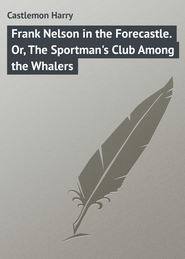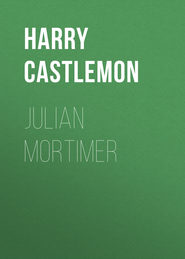По всем вопросам обращайтесь на: info@litportal.ru
(©) 2003-2025.
✖
A Rebellion in Dixie
Настройки чтения
Размер шрифта
Высота строк
Поля
The gag was duly cut and prepared, and nothing was wanting except another word from Mr. Kelley to induce Sim to put it where it belonged; but the man took just one look at it and concluded that the best thing he could do was to keep still. He never showed any disposition to open his head until the scouts were seen coming back with the information that the train was approaching. They came in a hurry, too, as if they were anxious to get something off their minds.
“Where’s Sprague?” were the words they shouted as they galloped along the road; whereupon Mr. Sprague showed himself. “The train is coming,” they said, as soon as they came within hearing of their leader. “Every blessed one of them is coming, and are acting as if they didn’t fear anything.”
“Did they see you?” inquired Mr. Sprague.
“No, they didn’t. We hid our horses in the bushes, and then went and lay down beside the road until we saw the train coming. Yes, sir, we’re going to get them all.”
Mr. Sprague and his scouts went into the bushes again out of sight, and then he noticed that Mr. Kelley wasn’t so anxious to keep in the background so much as he had been. He was even disposed to go out of the bushes, but he hadn’t made many steps in that direction when Simeon seized him by the collar and stretched him flat on his back.
“Oh, now, Simeon – ”
“Not another word out of you,” said his guard, savagely. “You will get the gag in your mouth as sure as you’re alive.”
“Take your stand close behind him,” said Mr. Sprague, who was getting angry now, “and with the very first words he utters shoot him down. We are not going to have our plans spoilt for the sake of him.”
Leon, who stood close at his father’s side and heard all this conversation, grew as pale as death when he found that the wagon-train was coming. He clutched his revolver nervously, and determined that whatever danger his father got into he would be there to help him. The leader glanced at his son’s pale face and said, in a low tone:
“Leon, I think you had better stay here as a guard to these prisoners.”
“Are you going out there to face that escort?” asked Leon.
“Of course I am. I shall be right in the thickest of it.”
“Then I’m going, too.”
“But you will be safe here. They can’t hit you, even if they shoot at you.”
But Leon only shook his head, and at that moment somebody whispered that the foremost wagons were in sight. That turned Mr. Sprague’s attention into a new channel, and Leon was left to himself. He glanced at Simeon and his captive, and was gratified to see that Mr. Kelley had been forced to sit down, and Simeon was standing there with his cocked gun ranged within two inches of his head. He wanted to speak, and made a motion to Simeon to turn the gun the other way, but as often as he did this the piece was raised to his guard’s shoulder, and the words froze on his lips.
The foremost wagon came along as rapidly as the mules could draw it, and after what seemed an age to Leon the wagons were all in view. When the leading wagon was almost opposite to him Mr. Sprague raised his hand to his mouth and gave a shrill whistle. Never in his life had he given a better one. He wasn’t excited at all. There was a moment’s silence there in the brush, and out popped the cavalry and infantry, and in less time that it takes to tell it the wagon-train was surrounded. Not a shot was fired. To say that the rebels were astounded would not half express their feelings. Every teamster had three or four guns looking at him, and the cavalry, who occupied the advance of the train, were surrounded with horsemen that were two to their one.
“Well, by George! You have done this up in good shape,” said the rebel captain, after he had taken time to get his wits together. “What are you – Union?”
“Yes, sir; Union to the backbone,” replied Mr. Sprague. “May I trouble you for your sword and revolver?”
“That was as neat a surprise as I ever saw,” said the captain, as he unbuckled his belt and handed it to Mr. Sprague. “You didn’t give us time to fire a shot. What are you going to do with us? Put us in jail?”
“No, sir. We shall allow you to go where you please,” said Mr. Sprague, accepting the belt and fastening it about his own waist. “We are not making war on your folks now, but on your provisions. We shall have to take your horses, too. Dismount.”
“I guess father’s all right, and now I’ll get some weapons of my own,” said Leon, as he turned his horse and rode along the line of the escort. “There must be some rebels in there that haven’t given up all their fire-arms.”
As he rode along he found a soldier on the inside of the third four who held his weapons in his hand and was looking around for somebody to give them to. When he saw Leon approaching he held his sword, revolver and carbine toward him over his companion’s horse.
“Come out here,” said Leon. “I shall have to take your horse as well as your weapons.”
“Well, I can’t help it, can I?” said the rebel, who was more inclined to laugh than he was to feel despondent over it. He came out and proceeded to give up his horse and weapons to Leon, and at the same time he took particular pains to place himself on the boy’s side next to the woods. In this way he could talk to him without his rebel friends hearing it.
“Say,” he added, “you won’t take me to jail, will you?”
“Certainly not,” said Leon.
“Don’t talk so loud. I don’t want my companions to know that I have found a friend among Union men. Let me go out in the woods a little while, and I will come back sure when you are all ready to start for home.”
“You will only be giving yourself trouble if you do that,” said Leon, who thought his rebel friend was taking a queer way to escape. “As soon as we get your weapons we intend to turn you all loose, to go where you please.”
“But I don’t want to go with those rebels,” said the young soldier, earnestly. “I am a Union man, and I went into the army because I had to. I will come back, sure.”
“Well, go ahead, but don’t let anybody see you.”
When Leon led the captured horse back to his father’s side he found that the escort had all been dismounted and disarmed, and were now standing there and awaiting further orders. Some were disposed to be angry and sullen, while others were laughing over what they considered a first-class surprise. Mr. Sprague was highly elated over it. He did not show it, but there was something about him that made Leon feel happy, too. The goods that were captured that day must have been worth $500,000.
“Now, Captain, you are all right, and I will bid you good-day,” said Mr. Sprague. “You can go ahead, and as fast as the teamsters come up, we’ll send them on after you. Silas, go back there and send up all the teamsters.”











